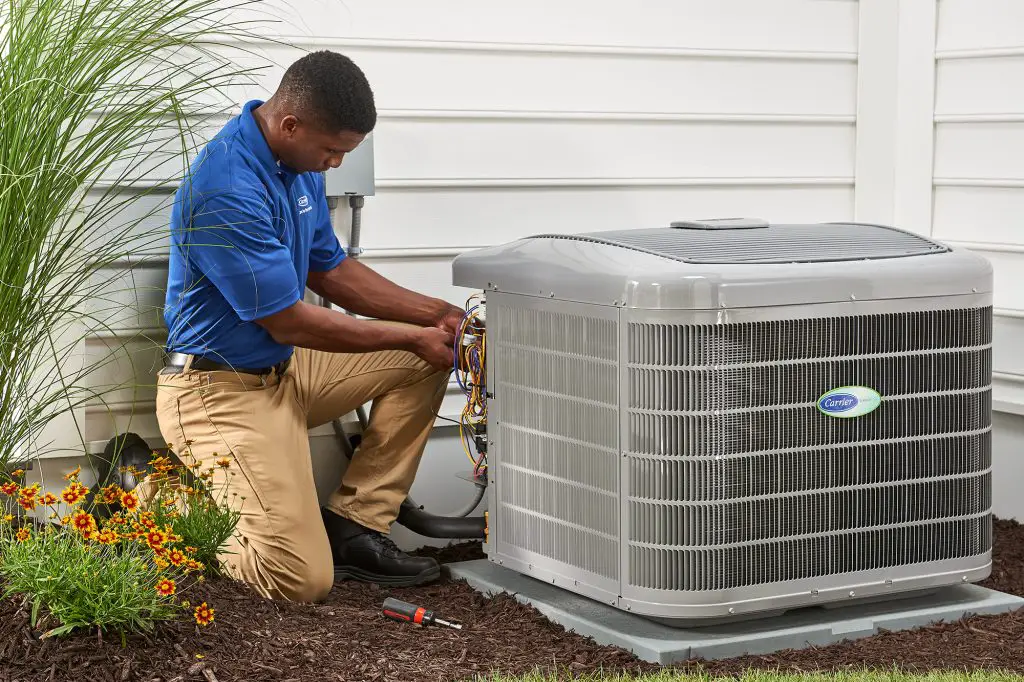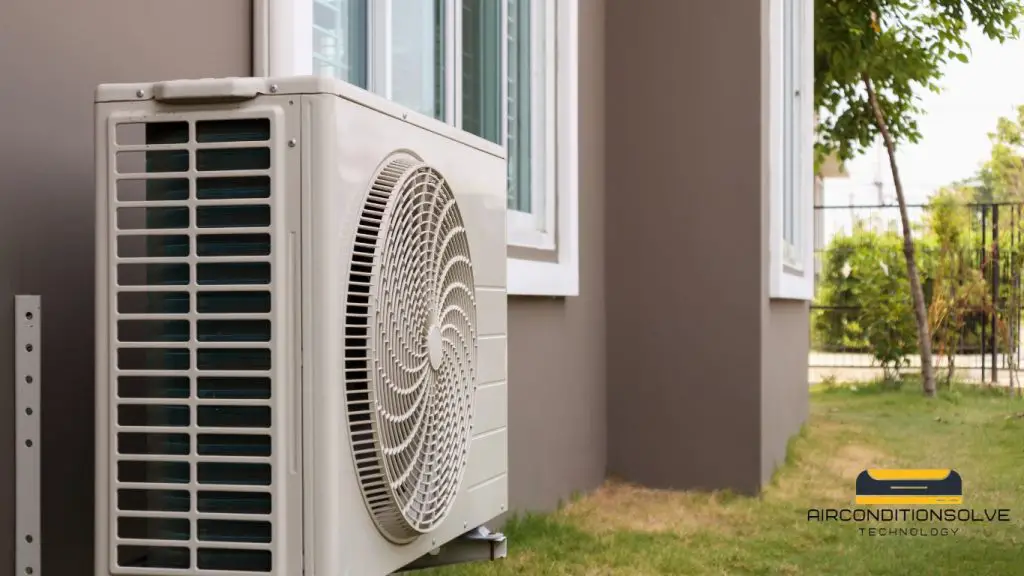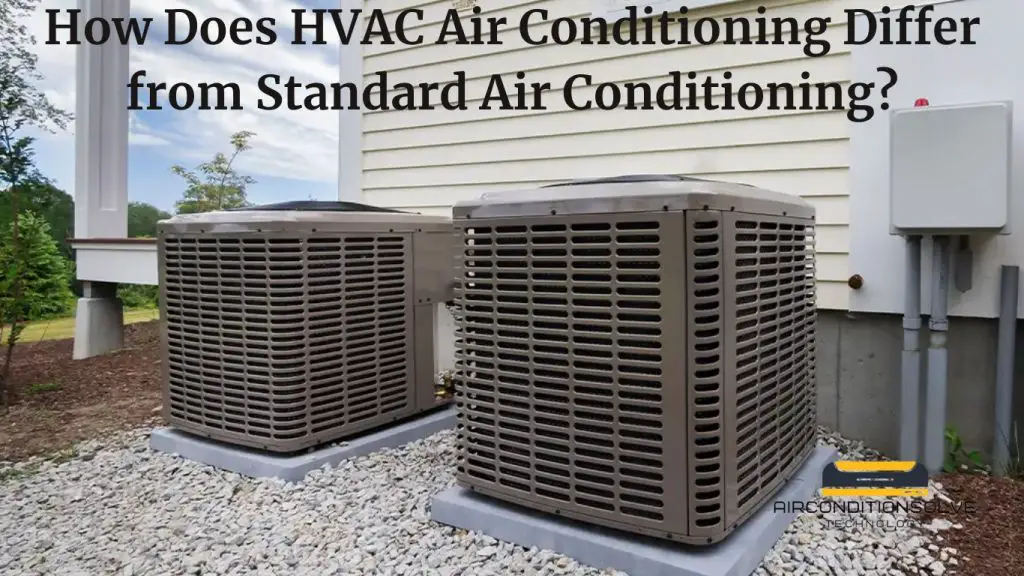HVAC air conditioning differs from standard air conditioning in its ability to both heat and cool the air.
Understanding The Differences
When it comes to keeping our homes and offices comfortable, air conditioning plays a crucial role. However, there is often confusion between HVAC air conditioning and standard air conditioning systems. While both serve the purpose of cooling and dehumidifying the air, there are key distinctions that set them apart. In this article, we will explore the differences between HVAC air conditioning and standard air conditioning systems, providing a clear understanding of their definitions, functionalities, and important distinctions.
HVAC Air Conditioning Definition And Functionality
Definition: HVAC, short for Heating, Ventilation, and Air Conditioning, is an integrated system designed to provide heating, cooling, and proper airflow within a building.
Functionality: HVAC air conditioning systems combine heating, cooling, ventilation, and air filtration in a single unit, providing comprehensive control over indoor temperature, humidity, and air quality. These systems are typically centralized, with a network of ducts distributing conditioned air throughout the building.
Standard Air Conditioning Definition And Functionality
Definition: Standard air conditioning, also known as a split system, refers to a standalone cooling unit that is not connected to a heating system or other ventilation components.
Functionality: Standard air conditioning units focus solely on cooling the air. They consist of an outdoor condenser unit and an indoor evaporator unit, connected by refrigerant lines. The indoor unit blows cool air into the room while transferring the heat outside.
Key Distinctions Between HVAC And Standard Air Conditioning
| HVAC Air Conditioning | Standard Air Conditioning |
|---|---|
| HVAC systems provide both heating and cooling. | Standard air conditioning only provides cooling. |
| They are integrated systems with centralized control. | Standard air conditioning units are standalone and operate independently. |
| HVAC systems include air filtration and ventilation components. | Standard air conditioning units do not include air filtration or ventilation components. |
| HVAC systems are suitable for larger spaces and buildings. | Standard air conditioning units are more commonly used in smaller residential or commercial spaces. |
With a clear understanding of the differences between HVAC air conditioning and standard air conditioning, it becomes easier to make informed decisions when it comes to choosing the right cooling system for your needs. Whether you require comprehensive temperature control and air quality management or a simple cooling solution, both options have their distinct advantages.

The Importance Of HVAC Systems
HVAC systems are crucial for maintaining comfortable indoor temperatures. However, HVAC air conditioning differs from standard air conditioning as it regulates humidity and filters air, ensuring clean and healthy living spaces.
Role Of HVAC Systems In Commercial And Residential Settings
Nowadays, HVAC systems have become an essential aspect of comfortable living and efficient working. In both commercial and residential settings, HVAC (Heating, Ventilation, and Air Conditioning) systems play a crucial role in maintaining the optimal indoor environment. These systems not only cool or heat the air but also help in regulating humidity levels and ensuring proper ventilation.
In commercial settings, such as office buildings, hospitals, shopping malls, or manufacturing facilities, HVAC systems are vital for providing a comfortable and healthy environment for employees and visitors. In residential settings, HVAC systems enhance the overall indoor living experience, making homes cozy during cold winters and refreshing during hot summers.
Advantages And Benefits Of HVAC Systems
Installing HVAC systems offers numerous advantages and benefits for both businesses and homeowners. Let’s explore some of the key advantages:
- Energy Efficiency: HVAC systems are designed to maximize energy efficiency, helping you reduce your carbon footprint and save on energy bills.
- Improved Indoor Air Quality: HVAC systems have filters that trap airborne pollutants, preventing them from circulating in the air. This helps maintain a healthier environment by reducing the risk of respiratory problems and allergies.
- Temperature and Humidity Control: HVAC systems provide precise temperature control, ensuring a comfortable indoor environment regardless of external weather conditions. Additionally, they regulate humidity levels, preventing excessive moisture buildup that can lead to mold growth.
- Noise Reduction: A well-maintained HVAC system operates quietly, creating a peaceful and serene indoor atmosphere.
- Zoning Possibilities: HVAC systems allow for zoned heating and cooling, enabling you to customize the temperature according to specific areas of your commercial or residential space. This helps optimize comfort and energy savings.
Challenges And Considerations With HVAC Systems
While HVAC systems offer numerous benefits, it is crucial to consider some challenges and factors when choosing and using these systems:
- Initial Investment: The installation cost of HVAC systems can vary depending on the size and complexity of the system. However, the long-term energy savings often outweigh the initial investment.
- Maintenance and Repairs: Regular maintenance is necessary to keep HVAC systems operating efficiently. Additionally, occasional repairs or part replacements may be required to ensure optimal performance.
- Environmental Impact: While HVAC systems have improved in terms of energy efficiency, they still consume energy and contribute to greenhouse gas emissions. It’s important to choose systems that prioritize environmental sustainability.
- Technical Expertise: Proper installation and maintenance of HVAC systems require technical expertise. It is advisable to engage professional HVAC technicians for installation, repairs, and regular servicing.
Considering the crucial role HVAC systems play in maintaining a comfortable indoor environment, it is essential to weigh the advantages and challenges before selecting the right HVAC system for your commercial or residential setting.
Key Components Of HVAC Air Conditioning
HVAC air conditioning, or Heating, Ventilation, and Air Conditioning, is a comprehensive system that goes beyond conventional air conditioning. It involves several key components that work together to provide optimal temperature control, ventilation, and air quality in your space. Understanding these components will help you recognize the distinctive features of HVAC air conditioning and how it differs from standard air conditioning.
Heating And Cooling Options
The first component of HVAC air conditioning is its capability to both heat and cool the air. Unlike standard air conditioning units that solely focus on cooling, HVAC systems are designed to regulate temperature in various weather conditions. This means that during colder months, an HVAC system can efficiently warm your space, ensuring comfort throughout the year.
Ventilation And Air Quality Control
Ventilation is another critical aspect of HVAC air conditioning systems. These systems are equipped with advanced ventilation mechanisms that bring in fresh air from outside while expelling stale air. Through the use of filters and air purifiers, HVAC systems also enhance the air quality by removing pollutants, allergens, and odors. This not only provides a more pleasant environment but also helps improve overall health and well-being.
Thermostat And Control Systems
A perfect balance of temperature, ventilation, and air quality is achieved through a sophisticated thermostat and control system in HVAC air conditioning. These systems go beyond the basic functions found in standard air conditioning units. With programmable thermostats, you can easily set temperature schedules and regulate the specific areas within your space. Additionally, smart control systems allow for remote access and provide real-time data to monitor and adjust the HVAC settings efficiently.
In conclusion, HVAC air conditioning differentiates itself from standard air conditioning through its comprehensive approach to temperature control, ventilation, and air quality. By incorporating heating options, advanced ventilation mechanisms, and sophisticated control systems, HVAC air conditioning provides a complete solution for your comfort and well-being.
Standard Air Conditioning Systems
In the realm of air conditioning, there are various types of cooling systems available to suit different needs. One of the most common types is the standard air conditioning system. These systems are designed to cool the air in an enclosed space, such as a room or a building, using a refrigeration cycle. In this section, we will explore the different types of standard air conditioning units, their pros and cons, as well as their appropriate uses.
Types Of Standard Air Conditioning Units
Standard air conditioning units come in different forms, each with its own set of characteristics and features. Here are a few commonly used types:
1. Window Air Conditioners
Window air conditioners are standalone units installed in a window or a hole in the wall. They are popular for cooling individual rooms or small spaces, as they are relatively affordable and easy to install. These units consist of a cooling coil, a compressor, a fan, and controls designed to regulate the temperature and airflow.
2. Split Air Conditioners
Split air conditioners consist of two main components: an indoor unit and an outdoor unit. The indoor unit, usually mounted on a wall, houses the cooling coil and the fan, while the outdoor unit contains the compressor and the condenser. This type of system offers greater flexibility in terms of cooling larger areas and allows for more precise temperature control.
3. Packaged Air Conditioners
Packaged air conditioners are commonly used in commercial spaces or buildings where all the components of the system are packaged together in one unit. This includes the compressor, cooling coil, condenser, and fans. These units are typically installed on the roof or in a designated area outside the building.
Pros And Cons Of Standard Air Conditioning
Standard air conditioning systems come with their own set of advantages and disadvantages. Let’s take a look at a few of these:
Pros:
- Reliable cooling: Standard air conditioning systems provide efficient and reliable cooling, ensuring comfort in hot weather.
- Availability: These systems are readily available and easily accessible, making them a popular choice for both residential and commercial spaces.
- Cost-effective: Standard air conditioning units are generally more affordable compared to other types of cooling systems, especially for smaller areas.
Cons:
- Energy consumption: Standard air conditioning systems can consume a significant amount of electricity, leading to higher utility bills.
- Installation limitations: Some units, such as window air conditioners, may have limited installation options, making them unsuitable for certain spaces or buildings.
- Limited cooling capacity: Standard air conditioning units may not be suitable for cooling larger areas or multiple rooms.
Appropriate Uses For Standard Air Conditioning
Standard air conditioning systems are commonly used in various settings, including:
- Residential homes: Window or split air conditioners are often used to cool individual rooms or apartments.
- Small offices: Standard AC units are suitable for cooling small office spaces with limited cooling requirements.
- Retail stores: These systems can adequately cool small to medium-sized retail stores.
When considering air conditioning options, it is essential to evaluate the specific cooling needs of your space to determine which type of system is most appropriate for you.
Selecting The Right Air Conditioning System
Selecting the right air conditioning system for your home or office is an important decision that can affect your comfort and energy efficiency. When it comes to choosing between HVAC air conditioning and standard air conditioning, there are several factors to consider. These factors include cost considerations, climate, and efficiency factors. Let’s take a closer look at each of these considerations to help you make an informed decision.
Factors To Consider When Choosing Between Hvac And Standard Air Conditioning
Cost Considerations
One of the primary factors to consider when selecting an air conditioning system is the cost. HVAC air conditioning systems are typically more expensive upfront compared to standard air conditioning units. This is because HVAC systems are designed to provide both heating and cooling functions, making them more versatile and complex. Standard air conditioning units, on the other hand, are focused solely on cooling.
While HVAC systems may have a higher initial cost, they can offer long-term cost savings due to their energy efficiency. HVAC systems integrate with a central thermostat and allow for zoned cooling and heating, which helps reduce energy wastage by only cooling or heating occupied areas.
Climate And Efficiency Factors
Another crucial consideration is the climate in which you live and the efficiency of the air conditioning system. HVAC systems are generally more efficient than standard air conditioning units, especially in extreme weather conditions. HVAC systems feature variable speed motors that adjust the airflow based on the heating or cooling demand, resulting in energy savings.
In addition, HVAC systems can also provide better air quality by filtering and purifying the indoor air. This is particularly beneficial for individuals with respiratory conditions or allergies, as the HVAC system can help remove pollutants and allergens from the air.
Standard air conditioning units, while less expensive upfront, might struggle to maintain optimal temperature and humidity levels in extreme climates. They may also consume more energy, leading to higher utility bills in the long run.
In conclusion, selecting the right air conditioning system involves considering multiple factors such as cost, climate, and efficiency. HVAC systems provide the versatility of both cooling and heating functions, along with energy efficiency and improved air quality. On the other hand, standard air conditioning units are more budget-friendly upfront, but they may lack the efficiency and capabilities of HVAC systems.
Credit: www.thisoldhouse.com
Frequently Asked Questions Of How Does Hvac Air Conditioning Differ From Standard Air Conditioning?
How Does Hvac Air Conditioning Differ From Standard Air Conditioning?
HVAC air conditioning systems, also known as heating, ventilation, and air conditioning systems, provide both heating and cooling capabilities. Standard air conditioning systems, on the other hand, only provide cooling. HVAC systems are more versatile and can maintain a comfortable temperature in a wide range of climates, making them ideal for homes and buildings in regions with variable weather conditions.

Conclusion
To sum up, HVAC air conditioning and standard air conditioning have notable differences. While standard air conditioning focuses on cooling the air, HVAC systems encompass both heating and cooling. Additionally, HVAC systems are more complex and versatile, providing efficient temperature control throughout the year.
Understanding these distinctions will help make informed decisions about the most suitable option for your needs.

